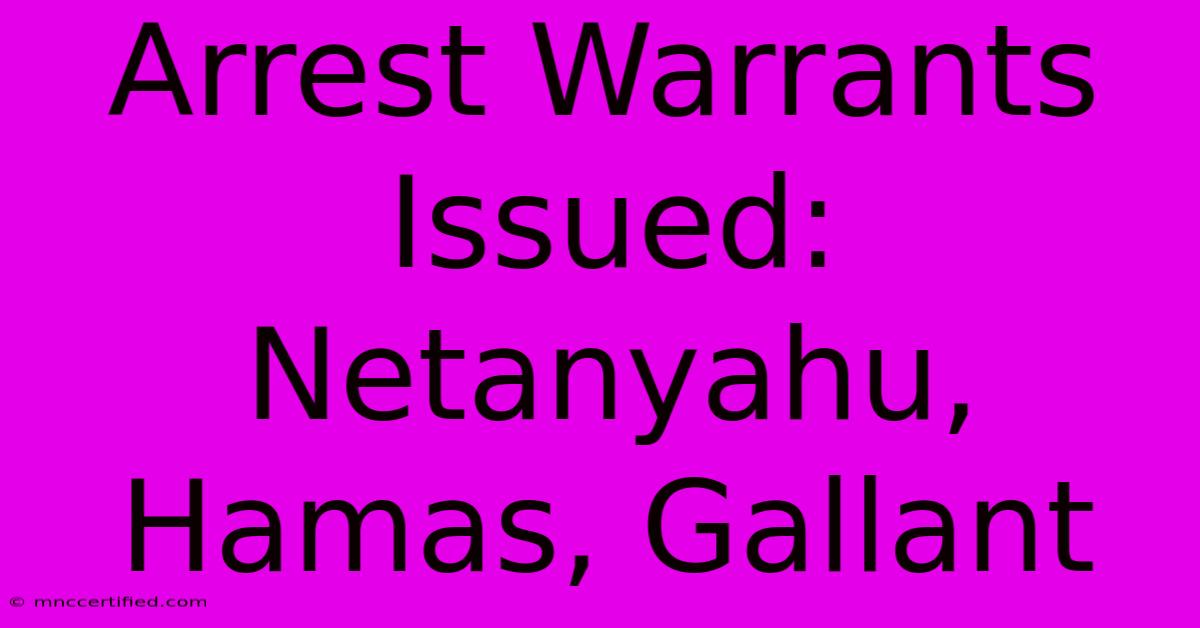Arrest Warrants Issued: Netanyahu, Hamas, Gallant

Table of Contents
Arrest Warrants Issued: Netanyahu, Hamas, Gallant – Unpacking the Complexities
The recent issuance of arrest warrants targeting prominent figures like Benjamin Netanyahu, Hamas leaders, and Israeli Defense Minister Yoav Gallant has sent shockwaves through global news. This article delves into the circumstances surrounding each case, examining the legal ramifications and broader geopolitical implications. Understanding the complexities behind these warrants requires a nuanced approach, separating fact from speculation and recognizing the vastly different contexts involved.
Netanyahu: A Domestic Political Storm
The arrest warrant issued for Benjamin Netanyahu stems from ongoing corruption investigations within Israel. These investigations, which have spanned several years, center around allegations of bribery, fraud, and breach of trust. Netanyahu, vehemently denying all charges, has framed the investigations as a politically motivated witch-hunt orchestrated by his opponents. The timing of any potential arrest and its impact on Israeli politics remain highly uncertain, potentially triggering significant domestic instability.
Key Considerations Regarding Netanyahu's Case:
- Legal Process: The Israeli legal system, while independent, operates within a complex political landscape. The implications of any arrest or trial for Netanyahu extend far beyond the individual charges, affecting the stability of the government and the future of Israeli politics.
- Public Opinion: Public opinion in Israel is deeply divided, with strong support for and against Netanyahu. This division significantly impacts the political ramifications of the ongoing investigations and any potential arrest.
- International Implications: While primarily a domestic matter, the outcome of Netanyahu's legal battles could influence Israel's international standing and relationships with key allies.
Hamas: International Criminal Accountability
Arrest warrants issued for Hamas leaders are significantly different, arising from international efforts to hold the group accountable for war crimes and crimes against humanity. These warrants, often issued by the International Criminal Court (ICC) or other international bodies, relate to alleged actions during conflicts with Israel, including the targeting of civilians and the use of human shields.
Key Considerations Regarding Hamas Arrest Warrants:
- Jurisdictional Challenges: Enforcing international arrest warrants against Hamas leaders poses significant logistical and jurisdictional challenges. Many Hamas leaders operate within territories where international law enforcement has limited reach.
- Political Ramifications: The issuance of these warrants highlights the international community's condemnation of Hamas's actions, but their enforceability remains a major obstacle. The political implications are far-reaching, impacting international relations and the ongoing Israeli-Palestinian conflict.
- Evidence and Due Process: The legal process surrounding these warrants demands rigorous examination of evidence and adherence to due process principles, even in the context of alleged atrocities.
Gallant: A Case of Internal Political Friction
The situation surrounding Israeli Defense Minister Yoav Gallant represents a distinct scenario. Any potential arrest warrant would likely originate from within Israel's legal system, potentially stemming from internal political disputes or allegations of misconduct related to his official duties. This context significantly differs from the other cases, emphasizing the intricate dynamics of Israeli internal politics.
Key Considerations Regarding Gallant's Potential Arrest:
- Political Context: An arrest warrant for Gallant would have immense implications for the Israeli government's stability and national security policies. It reflects a critical power struggle within the ruling coalition.
- National Security Concerns: Given Gallant's role, an arrest could raise significant concerns about national security, particularly during times of geopolitical tension.
- Transparency and Accountability: The circumstances surrounding any potential investigation and subsequent warrant would need to be transparent and accountable to the Israeli public and the international community.
Conclusion: Navigating a Complex Web
The issuance of arrest warrants for Netanyahu, Hamas leaders, and potentially Gallant highlights a complex interplay of domestic politics, international law, and ongoing geopolitical conflicts. Each case presents unique challenges and considerations, demanding a careful examination of the legal processes, political contexts, and potential ramifications. The situation underscores the need for continued monitoring and analysis as these cases unfold, shaping the political landscapes of Israel and the broader Middle East. Understanding the nuances of each situation is crucial for informed discussion and analysis of these significant developments.

Thank you for visiting our website wich cover about Arrest Warrants Issued: Netanyahu, Hamas, Gallant. We hope the information provided has been useful to you. Feel free to contact us if you have any questions or need further assistance. See you next time and dont miss to bookmark.
Featured Posts
-
Amtrust Certificate Of Insurance
Nov 22, 2024
-
Captain Toms Legacy Village Shame
Nov 22, 2024
-
John Prescott Angela Rayners Precursor
Nov 22, 2024
-
Get To Know Reverend Richard Coles Life And Work
Nov 22, 2024
-
Snowflake Surges Revenue And Profit Top Expectations
Nov 22, 2024